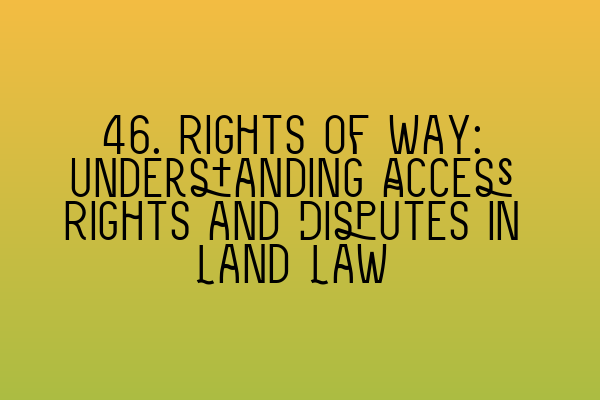46. Rights of Way: Understanding Access Rights and Disputes in Land Law
Welcome to SQE Property Law & Land Law, where our team of expert solicitors are dedicated to providing you with comprehensive guidance and legal advice on all aspects of property law. In this article, we will delve into the complex world of rights of way, exploring the importance of understanding access rights and potential disputes that can arise.
Before we dive into the intricacies of rights of way, it is essential to define what it actually means. In simple terms, a right of way is a legal right that grants a person or entity the freedom to pass over another person’s land. This can be essential for gaining access to a property or for utility services such as water, electricity, or gas.
The Significance of Access Rights
Access rights are of utmost importance in property law as they ensure that individuals have the necessary means to utilize their property effectively. Whether it is accessing a residential or commercial property, or even a piece of land for agricultural purposes, having a clear and unobstructed right of way is crucial.
Understanding access rights is particularly vital when dealing with property transactions. As a potential buyer or seller, you need to ascertain whether the property in question has any existing rights of way or if it requires one to be established. Failure to do so can lead to future complications and legal disputes, which can be both time-consuming and costly.
When it comes to access rights, there are two primary forms: express rights of way and implied rights of way.
Express Rights of Way
An express right of way is explicitly granted by the landowner and recorded in a legal document, such as a deed or contract. It provides a clear and legally binding obligation for the landowner to allow the specified individual or entity to access their property.
It is crucial to ensure that express rights of way are properly conveyed and registered as part of the property ownership. Our expert team of solicitors can assist you in drafting, reviewing, and registering such rights to protect your rights and provide peace of mind.
Implied Rights of Way
Implied rights of way, on the other hand, are not explicitly granted but are implied by the circumstances surrounding the property. These implied rights can arise when there is a historical pattern of use, which indicates that an individual or entity has been using a particular route to access their property for an extended period.
Implied rights of way can be more challenging to establish compared to express rights. However, our experienced team of solicitors can help you navigate through the legal complexities, gather evidence of historical use, and present a strong case in support of your implied right of way.
Common Disputes in Rights of Way
When it comes to rights of way, disputes can and do arise. These disputes can vary in nature and complexity, often leading to disagreements and legal battles between parties.
Here are some common disputes that can arise in relation to rights of way:
- Blocked or obstructed access: One party may intentionally or unintentionally obstruct the right of way, making it difficult or impossible for the other party to access their property. This can lead to frustration and legal action to rectify the situation.
- Altered route: If the landowner alters the route of the right of way without proper justification or agreement, it can cause significant inconvenience and potential loss of property value for the affected party.
- Disputed existence: There may be disputes over whether a right of way actually exists, either due to conflicting historical usage or lack of sufficient evidence to prove its existence.
- Overuse or abuse: Parties may disagree on the extent of usage allowed under the right of way, leading to conflicts over excessive use or abuse of the access rights.
- Encroachment: Encroachment occurs when a neighboring property extends onto the right of way, creating a physical obstruction that hampers access and usability of the affected property.
If you find yourself involved in a rights of way dispute, it is essential to seek legal advice promptly. Our team of solicitors has extensive experience in resolving such disputes, offering tailored solutions to protect your rights and achieve a fair resolution.
Conclusion
Rights of way are a critical aspect of property law, ensuring that individuals and entities have unobstructed access to their properties. Understanding access rights and potential disputes is crucial for property owners, buyers, and sellers.
If you require expert advice on rights of way or any other property law matters, do not hesitate to contact SQE Property Law & Land Law. Our team of solicitors is dedicated to providing you with top-quality legal services and exceptional customer care.
Related Articles:
